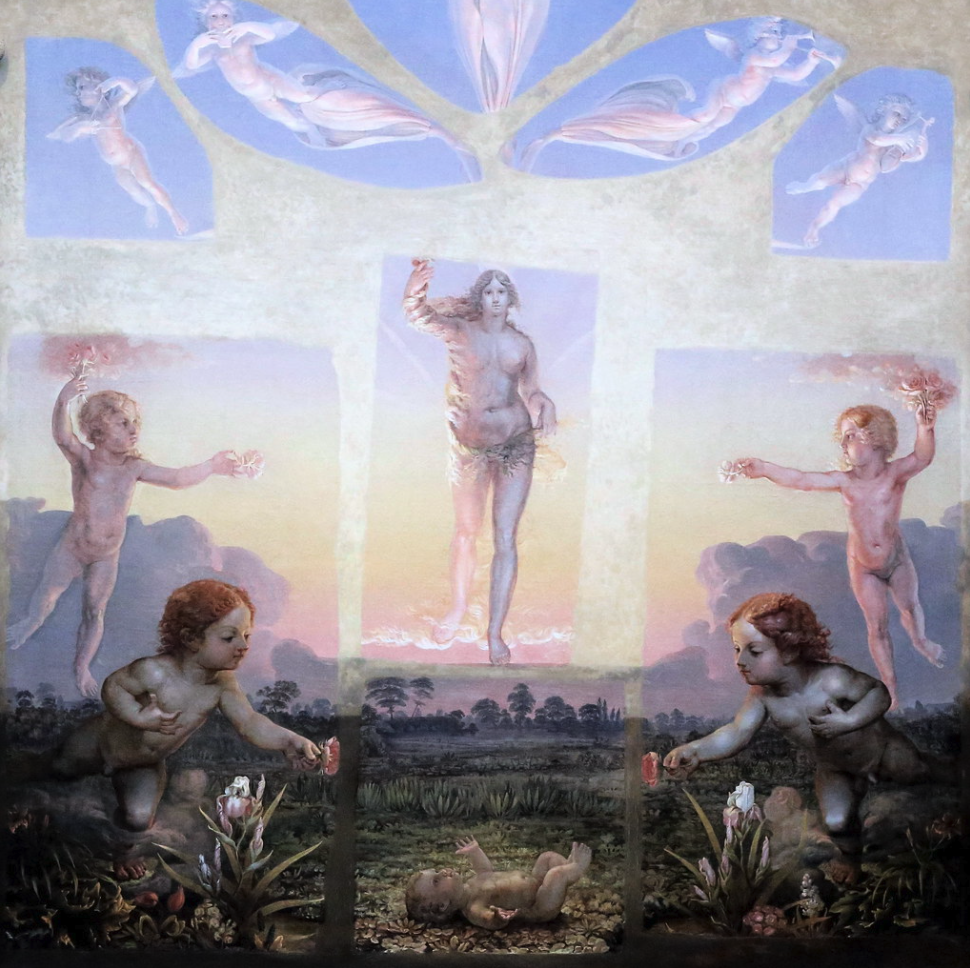Some Reflections on Integral Metaphysics
Metaphysics is not a science in the modern sense, but a mode of knowledge. Yet no conflict is conceivable between the two, nor there can be a symmetrical correlation between them, for their domains are so widely apart.

With the divine there is no turning: variableness belongs to the nature of the created. ~Philo
At first being of gross minds, they failed to realize that any being existed except sensible bodies. ~Saint Thomas Aquinas
The term "metaphysics" is indeed ambiguous.
For someone unfamiliar with this science in its technical or philosophical aspect, the term – as it has become customary in certain modern or pseudo-spiritual teachings – may at first bring up the notions of spirits, ghosts, energies, entities, auras, magic, and unseen forces; or more generally, it may refer to any conception imperceptible in the material realm.
On the other hand, for the modern philosopher, metaphysics is the "branch of philosophy that deals with the nature of existence, knowledge and truth." Whereas for a Traditional, or let us say "integral," metaphysician, metaphysics is the supreme science dealing with the nature of the Real; or a doctrine about Reality and its reflection of the plane of manifestation along with a method to apprehend the Truth and the Absolute.
It is not our purpose to give an extensive survey of metaphysics in this brief article, but will restrict ourselves to a brief treatment of what is referred to as "integral metaphysics."
The origination of the term metaphysics has an accidental character, as we shall see. The term originated from Aristotle's Metaphysics (Gr. τὰ μετὰ τὰ φυσικά, Latin. Metaphysica), in which he laid the foundation of his First Philosophy. It is important to note that the designation of this term had not occurred by Aristotle himself, but had been coined by the scholar who collected his works after Aristotle's death, which indicated the body of work to be studied after studying Physics. There has of course been a great deal of discussion among scholars on whether the prefix meta implies "after" or "above." Even the Muslim translators when translating the Metaphysics, were stuck between Ma-fawq al-tabiyya and Ma-Ba'd al-tabiyya (respectively, that which is above physics, and that which comes after physics). They eventually utilized the latter; however, based on the logic of the prefix and its etymology, it denotes that which is "above" physics. But according to Guenon our usage of the term metaphysic is due to the absence of a suitable word in modern European languages to transmit the full significance of this particular form of knowledge.
Although our subject is metaphysic, it would not be without relevance to say a few words about physics. Our modern mentality has a preconceived notion of this word and views it in a characteristically limited way. It will immediately conjure in our minds the notions of wave functions, dark matter, quantum particles, and the later developments of modern physics. But it should be noted that the "physics" of the ancients is not what is meant by physics today; the ancient phusikós was not a physicist concerned with the complexities of the objective world (natura naturata), but much more a "naturalist" dealing with Creatrix universalis, Deus,1 or Mother Nature (natura naturans). In other words, the Ancients' "science" was much more a scienta sacra, a sacred science wherein intelligence was rooted in faith and studied nature, not as an end itself, but to understand the relation between the Deity and the phenomenal world.
Now, in the modern world physics is that branch of science in which the very external properties of nature, such as matter and energy, are studied with a mathematical basis. And according to Bertrand Russel, the modern physicist does no more than finding pinpoints, and is therefore unable to know the essence of nature as it is, save only the appearances.2 Whereas for the ancients "physics" constituted the natural sciences as a whole and in a general manner.3 In the words of Guenon:
The term "physics," in its original and etymological sense, means precisely the "science of nature" without qualification; it is therefore the science that deals with the most general laws of "becoming," for "nature" and "becoming" are in reality synonymous, and it was thus that the Greeks, and notably Aristotle, understood this science.
According to this viewpoint the ancient philosophers who were concerned with "nature" were primarily metaphysicians in the strict sense of the term. If Thales designates "water" as the essence, it was not the physical water that he had in mind, but employed the term as a symbol for the Substance of the Universe. Thus the concept of "matter" was diametrically opposed to our modern understanding of it. In the words of a student of Greek Philosophy, Francis Cornford, if we would understand the ancient philosophers:
We should disabuse our minds of the atomistic conception of dead matter in mechanical motion and the Cartesian dualism of matter and mind.4
This "Cartesian dualism" is the sine qua non of both modern metaphysics and philosophy. For it was Descartes who, more than his contemporaries such as Leibnitz, attempted to reduce knowledge to the workings of the individual cognition. The cogito ergo sum of Descartes refers, not the Divine "I," but to the thinking ego. And it is for this reason that the metaphysician Ananda Coomaraswamy views this assertion of Descartes as the bottom level expression of European intelligence. For it was based on this assertion of Descartes that individualistic philosophies began to hold sway in the modern era. Had Descartes adhered to principles of traditional metaphysic, he would have changed his formulation to cogito, ergo Est (I think, therefore He is), in this manner he would have taken a special role in the perseverance of traditional metaphysics and, according to Nasr, maintained the central role of ontology in philosophy. In the words of Coomaraswamy:
Metaphysics prescinds from the animistic proposition of Descartes, Cogito ergo sum, to say, Cogito ergo Est; and to the question, Quid est? Answers that this is an improper question, because its subject is not a what amongst others but the whatness of them all and of all that they are not.5
What Descartes essentially did was that he drew a line of demarcation between matter and mind, and thus put all the qualitative values in the res cogitans or the cognitive substance, and placed all that was quantitative in the res extensa or the corporeal world and thus depleted nature of all her qualities. This bifurcation had a lethal effect upon traditional metaphysics which is diametrically opposed to this viewpoint, and in variance with the mechanistic notion of nature which views God as the clockmaker. Even Blaise Pascal, Descartes' contemporary and countryman, openly expressed his opposition with Descartes and said, "I cannot forgive Descartes. In all his philosophy he would have been quite willing to dispense with God. But he had to make Him give a fillip to set the world in motion; beyond this, he has no further need to God." The radical dualism of Descartes remained a constant variable in later Western philosophical thought, especially among Kant, Hume, and Hegel. "In every case their answer was at bottom the same: namely, that mind makes nature; nature is, so to speak, a by-product of the autonomous and self-existing activity of the mind."6 The reduction of knowledge to operations of the individual consciousness and the corporeal world to pure quantity resulted to a gradual eclipse of traditional metaphysics in the modern age.
Now, among European philosophers there are two figures whose philosophy bears a closer resemblance to traditional metaphysics, namely Pascal (1623-1662) and Leibnitz (1646-1716). And to those interested in the serious study of metaphysic we recommend reading the work of these two philosophers more than others.
Leibnitz, who was an accomplished mathematician and philosopher, proposed the idea of mondas, which are metaphysical points with a "pre-established" harmony, and also a mind which perceives its environment. "The monads have unity and spontaneous activity. They are in the world and a mirror upon the world outside themselves, each monad receiving effects at every moment in such a manner as to mirror what is happening elsewhere."7 Some of the themes of traditional metaphysics such as the divinely established harmony of nature and the great chain of being is treated in Leibnitz's philosophy. And this is not surprising since Leibnitz was a follower of the philosophia perennis, a term which he made famous in a letter written in 1714.
Returning now to metaphysics: it is rather impossible to bring about a definition of this term, for it is in its nature infinite and ipso facto cannot be limited to a definition. For to define is to limit, and metaphysics is essentially limitless. But were we to define integral metaphysics as traditionally understood, we may define it as "a doctrine about possibility: possibilities of being and not-being, of finite and infinite; those of finite being embodied mostly in what one calls ontology and cosmology" (Coomaraswamy); "a doctrine concerning the nature of the Real, combined with methods revealed by the Origin or Absolute Reality to enable the self or the soul, as usually understood, to return to the abode of the Self" (S.H. Nasr); "the science of the Absolute and of the true nature of things" (Schuon). We may also add that metaphysics is neither Western nor Eastern, "but universal, being in essence above and beyond all forms and all contingencies."8 But since nothing may be known except in the mode of the knower, this pure and primordial metaphysic finds expression in various clothes and forms of either the East or West.
But it is especially in the East that metaphysical doctrines had always been alive and remained central to the Oriental Weltanschauung. In the case of Islam, for example, pure metaphysics is to be found in Sufism which constitutes its 'mystical' kernel; in the Far East its fullest expression is in Taoism. But it is especially in India that metaphysics reaches its apex with the Vedanta – it is not without reason that Rene Guenon, who turned to Islam, employed the Vedantic point of view for the exposition of pure metaphysics. In the West, however, metaphysics of the highest order can be found in the Pythagorean-Platonic writings, and especially in the Enneads of Plotinus. In Christianity it can be found in the works of Meister Eckhart, Marsilio Ficino, Gregory of Nyssa, Erigena, Origen and Jacob Boehme. This integral metaphysics can also be found partly in the Latin writings of medieval scholastic philosophers, especially that of Thomism, although in a more hidden and indirect way.
But since pure intellection has become substituted by empirical and materialistic philosophies, and contemplation by technical knowledge, metaphysics has lost its central role in philosophies of both East and West. "What is usually called metaphysics in post-medieval philosophy is, for the most part, nothing but an extension of rationalistic philosophy and at best a pale reflection of true metaphysics. The so-called metaphysics that philosophers like Heidegger have criticized and consider as having come to an end is not the metaphysical doctrine we have in mind."9 Yet if one makes a profound study of the metaphysical doctrines of the twain, one finds a metaphysical thread in their philosophies and a common language of discourse which, despite the various external forms, makes them united in their very core. "Eine grosse Weltlinie der Metaphysik zieht sich durch aller Volker hindurch."
Metaphysics, moreover, has been likened to the subject of mathematics, for both are considered to be invariable and universal disciplines. Both can be viewed as impersonal, in that no mathematician or metaphysician can entertain private ideas and have personal opinions about a given axiom. Consider the following words of Dr. Nasr:
It is a science as strict and exact as mathematics and with the same clarity and certitude, but one which can only be attained through intellectual intuition and not simply through ratiocination. It thus differs from philosophy as it is usually understood. Rather, it is a theoria of reality whose realization means sanctity and spiritual perfection, and therefore fan only be achieved within the cadre of a revealed tradition. Metaphysical intuition can occur everywhere – for the "spirit bloweth where it listeth" – but the effective realization of metaphysical truth and its application to human life can only be achieved within a revealed tradition which gives efficacy to certain symbols and rites upon which metaphysics must rely for its realization.
This supreme science of the Real…is the only science that can distinguish between the Absolute and the relative, appearance and reality….Moreover, this science exists, as the esoteric dimension within every orthodox and integral tradition and is united with a spiritual method derived totally from the tradition in question.10
Again, we should beware of not confusing metaphysics with the various "sciences;" for it is not a science, properly speaking. Webster defines science as "knowledge or a system of knowledge covering general truths or the operation of general laws especially as obtained and tested through the scientific method and concerned with the physical world and its phenomena." What characterizes science is its systematic and experimental nature, both being the intrinsic qualities of the scientific method. But it must be understood that collating data and gathering information, along with experimentation and discoveries, are all invalid and non-sensical in the "metaphysical sphere." "For in a type of knowledge which calls for the use of no specialized or external means of investigation all that is capable of being known may have been known by certain persons at any and every period; and this in fact emerges clearly from a profound study of the traditional metaphysical doctrines."11 These doctrines, due to being universal, perpetual, and everlasting, are not attained by means of experimentation, but become as it were "crystilized" in Man's intellect, which is the organ in charge of metaphysical speculation.
The domain of every science is always dependent upon experimentation in one or other of its various modalities, whereas the domain of metaphysics is essentially constituted by that which cannot be investigated externally: being "beyond physics" we are also, by that very fact, beyond experiment. Consequently, the field of every separate science can, if it is capable of it, be extended indefinitely without ever finding the slightest point of contact with the metaphysical sphere.12
Thus we have noticed that metaphysics is not a science in the modern sense but a mode of knowledge. That this form of knowledge is not attained by gathering information, but is rather a vision - an act of perception in the intellect. And albeit it is not a science, yet no opposition or conflict is conceivable between the two, nor there can be a symmetrical correlation between them, for their domains are so widely apart. Science, essentially, is of the individual and the particular domain, whereas metaphysics is of the universal order. And due to being universal, metaphysics embraces all things, for the part is always in the whole. Therefore, whatever may be the subject of a particular science, it may also be examined through the lens of metaphysics, which provides a higher point of view, placing the subject in its proper place in a greater context. It is the "infallible standard by which not only religions, but still more 'philosophies' and 'sciences' must be 'corrected'… and interpreted."13
We should say a few words now about the difference between metaphysics and philosophy. What is taught as metaphysics as a branch of philosophy in universities today – which hardly goes beyond epistemology – is radically different from what we mean by metaphysics. "A metaphysical doctrine is the incarnation in the mind of a universal truth. A philosophical system is a rational attempt to resolve certain questions which we put to ourselves."14 Philosophical thought is carried out by ratiocination; whereas metaphysics proceeds by intellectual intuition which is issued from the pure intelligence. Moreover, metaphysics can never be systematic, but it is always consistent. The metaphysician, in contrast to the rationalistic philosopher, does not seek to prove his or her points. Observe the following words of Coomaraswamy:
The philosopher expects to prove his points. For the metaphysician it suffices to show that a supposedly false doctrine involves a contradiction of first principles. For example, a philosopher who argues for an immortality of the soul endeavors to discover proofs of the survival of personality; for the metaphysician it suffices to remember that "the first beginning must be the same as the last end" – from which it follows that a soul, understood to have been created in time, cannot but end in time.15
Again,
Modern philosophies are closed systems, employing the method of dialectics, and taking for granted that opposites are mutually exclusive. In modern philosophy things are either so or not so; in eternal philosophy this depends upon our point of view. Metaphysics is not a system, but a consistent doctrine; it is not merely concerned with conditioned and quantitative experience but with universal possibility.16
Metaphysical knowledge therefore is not of the individual order, but belongs in Guenonian terminology to the "supra-individual" and "supra-rational" realms. Meaning that it stands above reason – it is certainly not inferior to it. Being from a supra-individual order, metaphysical knowledge can only be comprehended by a supra-individual faculty which, as we have previously mentioned is the "universal intellect." This spark which is the intellect is a divine element inherent in the depth of the soul, in its purest and highest chamber and is free from all contingent and creaturely qualities. Since man's intelligence or intellect has a "total" character, it is thus proportioned to the totality of Truth and if cultivated and tempered properly, may attain to an ultimate Realization. Kant was right in stating that our reason is incapable of knowing "noumenon" as it is, but he is not so if the intellect is the knowing agent. The reduction of the Intellect to reason inaugurated by the figure of Kant and then prolonged by later Western philosophers marks the dawn of the gradual eclipse of pure metaphysics and intellection in the modern world.
Now, what is that particular object studied in metaphysics? We have already stated that the object which lies at the heart of metaphysic is none other than the Absolute, the Real, or the Eternal. In contrast to other philosophies, integral metaphysics does not begin with "Being," but the Principle of Being which is superior to It, namely Beyond-Being, the Unmanifest, the Abyss or Nonbeing; in Hindu phraseology it is with Brahman and not Ishvara that we are concerned. "The Beyond-Being generates Pure Being, Pure Being generates Universal Existence and Universal Existence actualizes and externalizes the latent possibilities in the world of existence as usually understood."17 The object of metaphysic, moreover, is always the same and is unaffected by any contingency or determination whatever. Consider the following words of Guenon:
It also follows that the object in question must always be absolutely the same and can in no wise be something that changes or that is subject to the influences of time and place; the contingent, the accidental, and the variable belong essentially to the individual domain.18
The question may arise that how can we attain metaphysical realization? Our answer is that this realization can only come about by means of a method and requires diligent practice and discipline. A certain connection with a living tradition, contact with the sense of the Sacred, purification of one's intelligence, cultivation of the cardinal virtues and elimination of evils and sins such as pride and pettiness are all required to bestow upon the mind and soul that primordial purity which allows the angel of knowledge to visit. "To speak of sacred knowledge without mentioning the crucial importance of the virtues as the conditio sine qua non for the realization of this knowledge, is to misunderstand completely the traditional sapiential perspective."19 According to the various traditions, this "primordial state" is the norm of the human life, and what we have in the modern world is nothing but a deviation from that Path, a sort of decline resulting from the progressive materialism inherent in the Kali-Yuga. Therefore, whoever wishes to attain metaphysical realization must practice the primordial states. In the words of Schuon, they ought to have "inward and outward participation in the 'Motionless Mover.'" And this includes raising one's consciousness to levels of reference beyond time – to eternity. For metaphysics, indeed, is the science of eternity.
In contrast to other forms of knowledge, metaphysic requires from its adherents to engage their whole being and not merely the mind. Thus in the process of Realization, intelligence must be wedded to the virtues and also the element of "faith," for in the words of St. Augustine, crede ut intelligas (believe so that you may understand) and intellige ut credas (understand in order to believe).
Nevertheless he is henceforth liberated from time, the apparent succession of things having been transmuted for him into simultaneity; he is in conscious possession of a faculty unknown to the ordinary man, which might be called the "sense of eternity." This is of extreme importance, for he who cannot rise above the vantage point of temporal succession and envisage all things in simultaneous mode is incapable of the least conception of the metaphysical order. The first thing to be done by those who wish to achieve true metaphysical understanding is to step outside time – we would willingly say into "non-time"…20
- "The nature, to wit, which created all others.: (St. Augustine, De Trinitate)
- As in Plato's myth, the cave-dwellers could only see the moving shadows on the wall and remained ignorant of the Sun outside.
- The Essential Rene Guenon, p. 97
- Principium Sapientiae p. 179
- A.K. Coomaraswamy, The Bugbear of Literacy, p. 124.
- Collingwood, The Idea of Nature, p.7
- S.H.Nasr, Religion and the Order of Nature.
- Rene Guenon, Oriental Metaphysics.
- S.H. Nasr, Man and Nature 82.
- A great world-line of metaphysics runs through all peoples. (J. Sauter)
- Rene Guenon, Essential Characteristics of Metaphysics.
- Ibid.
- Coomaraswamy, Selected Letters, 37.
- Frithjof Schuon, Spiritual Perspectives and Human Facts, p. 11.
- Ananda Coomaraswamy, Vedanta and the Western Tradition.
- Ibid.
- S.H. Nasr, The Essential Frithjof Schuon, p. 30.
- Rene Guenon, Essential Characteristics of Metaphysics.
- S.H. Nasr, Knowledge and the Sacred, p.312.
- Rene Guenon, Oriental Metaphysics.





